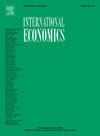Economic diversification in Saudi Arabia: Comparing the impact of oil prices, geopolitical risk, and government expenditures
Abstract
Our paper examines and compares the influence of oil prices, international geopolitical risks, and government expenditures on Saudi Arabia's economic diversification during 1970–2020. We employ the bounds testing approach to cointegration to estimate the parameters of the Autoregressive Distributed Lag model to attain the paper's goal. Our results show that oil prices and international geopolitical risk harm the KSA diversification process in the short run. The destructive effect of oil prices continues in the long run, while the impact of the international geopolitical risk does not persist. On the other hand, government expenditures encourage the diversification attitude in the short and long run. This outcome highlights the capability of the KSA government to stimulate the diversification process. It is a positive sign of the state capitalism doctrine's impact on the KSA economic diversification mechanism. From a policy implication perspective, our paper suggests prioritizing economic diversification clearly on the KSA government's agenda. Simultaneously, strengthening the KSA institutional framework and developing new forms of the social contract are critical to motivating the diversification process.

 求助内容:
求助内容: 应助结果提醒方式:
应助结果提醒方式:


